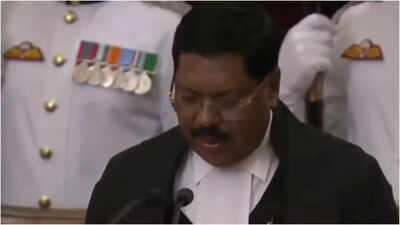NEW DELHI: Highlighting Supreme Court’s contribution in the last 75 years to accelerate political, economic and social justice to the poor and marginalised, CJI B R Gavai on Thursday told an assembly of top judges of Italy how the top court recently banned “bulldozer justice” and prevented the executive from becoming the judge, jury and executioner.Gavai was referring to SC’s judgment last year barring the executive from arbitrary demolition of houses of those accused of crime, bypassing the legal process, which violated citizens’ fundamental right to shelter under Article 21.CJI B R Gavai was speaking at the Milan Court of Appeal on ‘Role of Constitution in Delivering Socio-Economic Justice in a Country: Reflections from 75 Years of Indian Constitution”. “The executive cannot become judge, jury and executioner all at once,” the CJI said and quoted the judgment, which stated, “Construction of a house has an aspect of socio-economic rights.”“For an average citizen, construction of a house is often the culmination of years of hard work, dreams and aspirations. A house is not just a property but embodies the collective hopes of a family or individuals for stability, security and a future,” the CJI further added.“As we look back on these 75 years, there is no doubt that the Indian Constitution has strived for change in the life of the common people. To summarise, several aspects of Directive Principles were made enforceable by reading or legislating them as a facet of fundamental rights,” CJI Gavai said.“While Parliament took the lead by way of legislation and constitutional amendments, Supreme Court has consistently worked to transform socio-economic rights, ranging from education to livelihood, into enforceable fundamental rights, which were then given effect by Parliament,” he added.The CJI added that the Constitution’s journey in the past 75 years in delivering socio-economic justice “is a story of great ambition and important successes… the earliest initiatives undertaken by the Indian Parliament immediately after the adoption of the Constitution included land and agrarian reform laws and affirmative action policies for backward classes. The impact of these initiatives is clearly visible today”.CJI Gavai, the second Dalit to become the head of India’s judiciary, said, “Affirmative action policies in education, which sought to correct historical injustices and ensure representation of Scheduled Castes, Scheduled Tribes and socially and educationally backward classes, have been a concrete expression of the Constitution’s commitment to substantive equality and socio-economic justice.”Because of these measures, he could become CJI, Gavai said, adding that he was a product of the very constitutional ideals that sought to democratise opportunity and dismantle the barriers of caste and exclusion.
